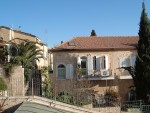Today I arose early and took a few minutes to look at the pearly dawn through my bedroom window. A bit later, I walked to the nearest grocery store and bought fresh bread for breakfast before I began my work day. All trivial, mundane things? Yes, but there is a difference, for I was doing them in Jerusalem.
No matter what ordinary events shape my day, the fact that they are happening here, in the Eternal City, somehow endows them with an extra dimension.
Jerusalem got its name because it has been the city of the Jewish people since the days of King David and his son Solomon, who built the First Temple here. Generation after generation continues to pray: “If I forget thee, O Jerusalem, may my right hand lose its cunning.” Devout Jews the world over turn towards Jerusalem three times a day in prayer, as the focus of their longing.
Five thousand years ago, a group of settlers chose to make their homes on the steep ridge called the Ophel, south of today’s Old City. Two thousand years later, David captured it from the Jebusites and, by bringing the Holy Ark here, he established forever its sanctity for Jews.
Jerusalem’s history spans 4,000 years. In 2000 BCE, Abraham offered his son Isaac for a sacrifice on Mount Moriah – ready to carry out the ultimate renunciation until the angel stayed his hand. A thousand years later, David captured the city and, from 961 BCE to 922 BCE, Solomon constructed the First Temple. In 537 BCE, Jews returned from Babylon, where they had been exiled by Nebuchadnezzar and, in 517 BCE, the Second Temple was completed. After that, Alexander the Great took the city and then Antiochus ruled it, until the Maccabees liberated it. In 63 BCE, Pompey captured Jerusalem and, over a period of 33 years, Herod reconstructed the Second Temple.
Jerusalem’s history continued to be a story of conquest and destruction by a chain of occupiers lusting for this precious jewel: the Romans, the Greeks, the Crusaders, the Mamelukes, the Ottoman Empire, the British Mandate, the Jordanians … a succession of nations who wanted to rule this battle-worn city that possesses no material riches – no gold, no precious metals, no minerals, no oil, nothing to enrich their coffers. So what does it possess?
I don’t know the answer but, in 1907, Hermann Cohen, in his Religiose Postulate, put forward the idea that they had no choice: “All nations, without exception, must go up with the Jews towards Jerusalem.”
Prior to that, in 1882, Peretz Smolenskin wrote, in Nekam Brith, a prophecy about its conquerors: “This shall be our revenge; we shall quicken what they shall kill and raise what they shall fell…. This is the banner of vengeance which we shall set up, and its name is – Jerusalem.”
Jews and non-Jews alike have always felt a magnetic pull towards the Holy City. It is written in Midrash Tehillim 91:7: “Praying in Jerusalem is like praying before the Throne of Glory, for the gate of heaven is there.” Every Jew who prays at the Western Wall feels an unusual closeness to G-d. Judah Stampfer, in his book Jerusalem has Many Faces (1950), expressed it poetically: “I have seen a city chiseled out of moonlight / Its buildings beautiful as silver foothills / While universes shimmered in its corners.”
There are many enchanting cities in the world, and I have visited many – Venice, Avignon, Bruges, Hong Kong, Paris, all have a magic that transforms the senses. Yet there is something extra in Jerusalem that I simply can’t define. It is a beautiful city, but there are many that exceed it. It is dignified, ancient, historic – all adjectives that can be applied to other cities, like London and Rome. Jerusalem, however, is an emotion, a state of mind even more than a place. It arouses dormant passions. It nurtures the soul. It is spiritual and inspiring.
To call Jerusalem home for the past 46 years is, for me, an enormous privilege. I am always aware of the history under my feet. I never forget the nameless heroes who fought to retain it for the Jewish people. And so, let us pay homage to the Maccabees, to those who withstood the Crusaders and Saladin and the Ottomans. And, in our own time, our Jewish soldiers who reunited Jerusalem in the Six Day War in 1967, 50 years ago. So many heroes, who made the ultimate sacrifice so that those of us in Jerusalem today could live out our lives in the Eternal City.
Dvora Waysman is the Australian-born author of 14 books. She came with her family to live in Jerusalem in 1971. She can be contacted at dwaysman@gmail.com or through her blog dvorawaysman.com.

